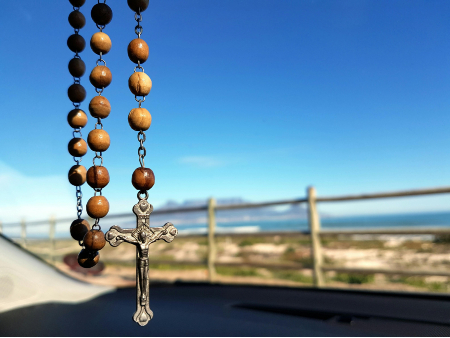 Hi readers, it seems you use Catholic Online a lot; that's great! It's a little awkward to ask, but we need your help. If you have already donated, we sincerely thank you. We're not salespeople, but we depend on donations averaging $14.76 and fewer than 1% of readers give. If you donate just $5.00, the price of your coffee, Catholic Online School could keep thriving. Thank you. Help Now >
Hi readers, it seems you use Catholic Online a lot; that's great! It's a little awkward to ask, but we need your help. If you have already donated, we sincerely thank you. We're not salespeople, but we depend on donations averaging $14.76 and fewer than 1% of readers give. If you donate just $5.00, the price of your coffee, Catholic Online School could keep thriving. Thank you. Help Now >
Monsignor Giussani on Movements of the Spirit
FREE Catholic Classes
"Faith Is Given Us So That We Communicate It"
ROME, FEB. 24, 2005 (ZENIT) - Here is one of the last public addresses given by Monsignor Luigi Giussani, the founder of the ecclesial movement Communion and Liberation. He died Tuesday at age 82.
He wrote this address for the Nov. 24-28 meeting of the Pontifical Council for the Laity. The theme of the assembly was "Rediscovering the True Face of the Parish."
* * *
Faith Is Given Us So That We Communicate It
By Monsignor Luigi Giussani
Can man save himself? To this question Christ answers, "No, man cannot save himself; it is in the companionship of God, of the mystery who has set himself beside him, part of his humanity, that Christ is the answer to man's supreme need, the need for his own salvation." This is the inconceivable and unforeseeable answer to man's need for salvation.
So the more man is aware of his limitation -- his frailty, his wrongdoing, his incapacity -- the more he is able to open himself to this answer. I think Reinhold Niebuhr's phrase is significant: "Nothing is so incredible as the answer to a question that is not asked." The gravest opposition, the greatest obstacle to the acknowledgment of Christ is, first and foremost, the non-acknowledgment of one's own human need, of the question that our humanity itself is.
We ask you, humbly: don't scroll away.
Hi readers, it seems you use Catholic Online a lot; that's great! It's a little awkward to ask, but we need your help. If you have already donated, we sincerely thank you. We're not salespeople, but we depend on donations averaging $14.76 and fewer than 1% of readers give. If you donate just $5.00, the price of your coffee, Catholic Online School could keep thriving. Thank you.Help Now >
How is what happened 2,000 years ago present here and now? The answer, as each of us knows, more or less, is: In the Church, the body of Christ, as St. Paul says in his Letter to the Ephesians, the Church "in which is the fullness of Christ" (cf. Ephesians 1:22-23).
It is in the Church that Christ is present. The Holy Father noted this in a speech that is memorable for me. "The rising up of the ecclesial body as an institution, its persuasive force and binding energy, have their roots in the dynamism of sacramental grace" [John Paul II to the priests participating in a course of spiritual exercises promoted by Communion and Liberation, Castel Gandolfo, Sept. 12, 1985]. In other words, the rising up of the ecclesial body, which is the way in which Christ is present here and now, is the work of the Spirit, "Dominum et vivificantem."
But how does the Church happen in its relationship with me, with the person? How does this influence, this nexus come about? The Pope's reply is that the rising up of the ecclesial body as an institution, as a persuasive force and binding energy, has its roots in the dynamism of sacramental grace, beginning with baptism. "However, it finds its expressive form, its operative modality, its concrete historical incidence, through the various charisms that characterize a temperament and a personal history" (ibid.).
The Pope calls "charism" the mode with which the Church takes up expressive form in a concrete, historical detail. The expressive form implies a determined, concrete, historical detail, and remains abstract if not considered up to this point. Its concrete historical incidence is realized by means of the various charisms that characterize a temperament and a particular history.
Let's keep in mind that the word "charism" has the same root, "charis," as the word "grace," and points to the energy with which the Spirit, in its intervention, re-creates the follower of Christ. If it were not to become concrete, adequate to my temperament and to my history, the Church would remain abstract.
In the same address, the Pope went on: "The charisms of the Spirit always create affinities destined to sustain each person in his objective task in the Church" (ibid.). A communion is created through this affinity: "The creation of this sort of communion is a universal law. Living it out is an aspect of obedience to the great mystery of the Spirit" (ibid.).
 Hi readers, it seems you use Catholic Online a lot; that's great! It's a little awkward to ask, but we need your help. If you have already donated, we sincerely thank you. We're not salespeople, but we depend on donations averaging $14.76 and fewer than 1% of readers give. If you donate just $5.00, the price of your coffee, Catholic Online School could keep thriving. Thank you. Help Now >
Hi readers, it seems you use Catholic Online a lot; that's great! It's a little awkward to ask, but we need your help. If you have already donated, we sincerely thank you. We're not salespeople, but we depend on donations averaging $14.76 and fewer than 1% of readers give. If you donate just $5.00, the price of your coffee, Catholic Online School could keep thriving. Thank you. Help Now >
What is obedience to the great mystery of the Spirit? Only one thing: "To believe in Jesus Christ." Christ becomes present here and now through a charism that, by valuing temperament, personality, and personal sensitivity and history, creates an affinity and this establishes a communion; to obey this communion is to obey the great mystery of the Spirit. It is to go to Christ!
Let us imagine a parish with 3,000 inhabitants and only one priest. He tries his best every Sunday from the pulpit, but leaves the faithful indifferent. In this town, the faith languishes; people go to Church in virtue of memories that still live on. Those who have a bit of life in them owe it to a personal piety. That priest is an ineffectual personality, so he is transferred -- he gets a promotion.
Another priest comes; he has more seniority, but he is sent there because he has fallen out with the Curia. On the first Sunday, he preaches at Mass, and immediately five people out of the 500 or so present are struck by what he says, and feel the need to get more involved with the Church and with the faith.
Imagine that those five people go separately to the new priest and tell him, "Listen, I was moved by what you said on Sunday and I realize that the faith has to involve my life and I want my life to be involved in the faith." So, since there are few structures in the town, the priest says, "Let's get together and form a small pastoral council." He will try firstly to nurture this small group, and with their help he will try to tackle the problems in the parish.
As two of them are man and wife, and rather well-off, since he is a doctor and she a teacher, they set up some initiative in the town, perhaps a small health center to help poor people, or a study group for youngsters. Then some more families join them, and after some months the parish is changed beyond recognition.
There is an intense participation in the Church's life and a great familiarity between the priest and his people; there is a kind of vibration of hope in those people, a desire to get to know the faith and the Church's teaching that was not there before. This happened because the priest who went there had a personality, a sensitivity, a temperament and a personal history that got things moving, that created movement. What happened is called "movement."
We ask you, humbly: don't scroll away.
Hi readers, it seems you use Catholic Online a lot; that's great! It's a little awkward to ask, but we need your help. If you have already donated, we sincerely thank you. We're not salespeople, but we depend on donations averaging $14.76 and fewer than 1% of readers give. If you donate just $5.00, the price of your coffee, Catholic Online School could keep thriving. Thank you.Help Now >
With the previous parish priest it didn't happen. It was not for any fault of his, but because the times of the Spirit are the times of the Spirit. So, in the case of the second parish priest, a charism was at work and a charism is characterized by historical incidence.
Without the movement I have tried to describe, a parish is arid and remains a mere institution. I have told my friends many times about my late mother and her priest, Father Amedeo, in Desio. Through his presence in the confessional, more than through the youth center, he created a reality of hundreds of women, all from Catholic families and devoted to the parish, all Children of Mary. They would go to Mass at 5 o'clock every morning, and were always ready to help when the parish needed something. Everyone in the parish knew them.
That priest in his confessional had created a movement in the parish, and in the town. If there had been a hundred thousand instead of a hundred of them, even the Corriere della Sera would have written about them! Father Amedeo, the curate in my huge parish 60 years ago, guided so many young people to Christian maturity, who then went on to bring up so many sound Christian families, and they were always ready to help the parish priest when he needed it.
With this example, I wanted to stress the absolutely personal nature of the way in which Christ, present here and now in the reality of the Church, becomes expressive, persuasive, educationally effective and constructive; able to build up a people.
So, I believe the Pope introduced the term "movement" as an ecclesiological category fundamental for describing pastoral dynamics.
Thus the word "movement" is not a problem that touches me particularly because we constitute a movement recognized by the Church, but is rather something that indicates a permanent mode in the Church's history through which the faith becomes persuasive, educationally effective and constructive, and brings a change in life.
This appears clear when we read St. Paul's letters, which mention Aquila and Prisca. The Spirit came down into the hearts of people who went to each others' homes through a personal temperament and history. If we don't understand this origin of a movement, we are unable to grasp how the institution we have in our hands -- a parish, an association, or a group -- can become alive, and so we can first become pretentious, and then disgusted and cynical, without hope.
For example, if I, as a parish priest, have people coming to me saying, "We want to work with you," and see that they are enthusiastic and fresh, thanks to something that has moved them (perhaps the encounter with a movement), the first thing I must desire is that they deepen faithfully what has aroused them, the experience that has struck them. Only in this case can the parish community benefit.
The aim of all that happens in the Church is to adhere to Christ so as to make his victory over the world present, and thus to anticipate the end of the world.
This phrase stresses the doctrinal content, from an existential point of view, the living object of faith, adhesion of life: "Whether you eat or drink, whether you wake or sleep, whether you live or die" (cf. 1 Thessalonians 5:10) -- in other words, everything -- so that the world may be ever more imbued with the miracle of a witness, that is to say, that the world may acknowledge him more and more. This is mission.
Christ himself has already defined the reason for which he came in Chapter 17 of John's Gospel, "I came that they may have eternal life: and this is eternal life, that they know you, the one true God and Jesus Christ whom you have sent" (cf. John 17:3-4).
The aim of the faith we have been given is the mission, and the mission is not for the hereafter, but for here and now. This is the category of our relationship with the world, whose first aspect is in us; it arises from the astonishment of feeling ourselves created alive.
The more a parish finds priests and faithful for whom the surprise of the Christ event, encountered and acknowledged, becomes the all-embracing horizon for thought and action and impassioned love for the mystery and for the destiny of their fellow men, the more the parish will be alive.
So the word "movement" describes the existential historical way in which the Church becomes a living Church. I believe that a priest who has a parish, or a priest who has a community of a movement, and doesn't pray the Spirit and doesn't tend to arouse some reality of "movement," will leave the Church like a tomb. The only thing that will be left of his parish will be the office, and the only thing that will be left of the community will be a group with a purely psychological or sociological value.
If a parish is alive, it is a movement, in the sense spoken of by John Paul II: "The Church herself is 'a movement'" [to the participants in the Convention "Movements in the Church," Castel Gandolfo, Sept. 27, 1981]. So, the theme of movement is in no sense an alternative to the institution, but indicates the way in which the institution becomes alive and missionary, because the faith is not given us in order that we preserve it, but in order that we communicate it. If we don't have the passion to communicate it, we don't preserve it.
Contact
Catholic Online
https://www.catholic.org
CA, US
Catholic Online - Publisher, 661 869-1000
info@yourcatholicvoice.org
Keywords
Giussani, Communion and Liberation, Faith, Christ, Laity
More Catholic PRWire
Showing 1 - 50 of 4,716
A Recession Antidote
Randy Hain
Monaco & The Vatican: Monaco's Grace Kelly Exhibit to Rome--A Review of Monegasque-Holy See Diplomatic History
Dna. Maria St. Catherine Sharpe, t.o.s.m., T.O.SS.T.
The Why of Jesus' Death: A Pauline Perspective
Jerom Paul
A Royal Betrayal: Catholic Monaco Liberalizes Abortion
Dna. Maria St.Catherine De Grace Sharpe, t.o.s.m., T.O.SS.T.
Embrace every moment as sacred time
Mary Regina Morrell
My Dad
JoMarie Grinkiewicz
Letting go is simple wisdom with divine potential
Mary Regina Morrell
Father Lombardi's Address on Catholic Media
Catholic Online
Pope's Words to Pontifical Latin American College
Catholic Online
Prelate: Genetics Needs a Conscience
Catholic Online
State Aid for Catholic Schools: Help or Hindrance?
Catholic Online
Scorsese Planning Movie on Japanese Martyrs
Catholic Online
2 Nuns Kidnapped in Kenya Set Free
Catholic Online
Holy See-Israel Negotiation Moves Forward
Catholic Online
Franchising to Evangelize
Catholic Online
Catholics Decry Anti-Christianity in Israel
Catholic Online
Pope and Gordon Brown Meet About Development Aid
Catholic Online
Pontiff Backs Latin America's Continental Mission
Catholic Online
Cardinal Warns Against Anti-Catholic Education
Catholic Online
Full Circle
Robert Gieb
Three words to a deeper faith
Paul Sposite
Relections for Lent 2009
chris anthony
Wisdom lies beyond the surface of life
Mary Regina Morrell
World Food Program Director on Lent
Catholic Online
Moral Clarity
DAN SHEA
Pope's Lenten Message for 2009
Catholic Online
A Prayer for Monaco: Remembering the Faith Legacy of Prince Rainier III & Princess Grace and Contemplating the Moral Challenges of Prince Albert II
Dna. Maria St. Catherine Sharpe
Keeping a Lid on Permissiveness
Sally Connolly
Glimpse of Me
Sarah Reinhard
The 3 stages of life
Michele Szekely
Sex and the Married Woman
Cheryl Dickow
A Catholic Woman Returns to the Church
Cheryl Dickow
Modernity & Morality
Dan Shea
Just a Minute
Sarah Reinhard
Catholic identity ... triumphant reemergence!
Hugh McNichol
Edging God Out
Paul Sposite
Burying a St. Joseph Statue
Cheryl Dickow
George Bush Speaks on Papal Visit
Catholic Online
Sometimes moving forward means moving the canoe
Mary Regina Morrell
Action Changes Things: Teaching our Kids about Community Service
Lisa Hendey
Easter... A Way of Life
Paul Spoisite
Papal initiative...peace and harmony!
Hugh McNichol
Proclaim the mysteries of the Resurrection!
Hugh McNichol
Jerusalem Patriarch's Easter Message
Catholic Online
Good Friday Sermon of Father Cantalamessa
Catholic Online
Papal Address at the End of the Way of the Cross
Catholic Online
Cardinal Zen's Meditations for Via Crucis
Catholic Online
Interview With Vatican Aide on Jewish-Catholic Relations
Catholic Online
Pope Benedict XVI On the Easter Triduum
Catholic Online
Holy Saturday...anticipation!
Hugh McNichol












 Daily Readings for Wednesday, April 17, 2024
Daily Readings for Wednesday, April 17, 2024 St. Anicetus: Saint of the Day for Wednesday, April 17, 2024
St. Anicetus: Saint of the Day for Wednesday, April 17, 2024 Prayer to Love God above all Things: Prayer of the Day for Wednesday, April 17, 2024
Prayer to Love God above all Things: Prayer of the Day for Wednesday, April 17, 2024
